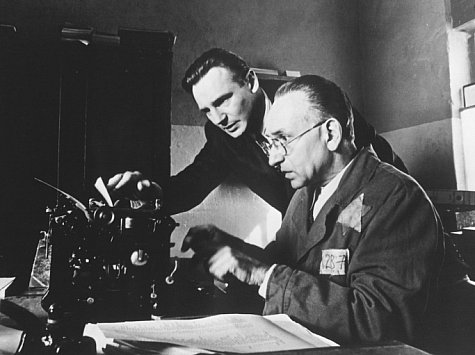How do you discuss the most acclaimed film in history that no one wants to see a second time? Schindler's List is an experience in every sense of the word. There had been Holocaust movies made before this, and a few since, but none told the story of a religion nearly been extinguished this well. There is a lot of violence but it is efficient and not gratuitous. Hardly anyone is shot a second time. Similarly there are no graphic torture or rape scenes, although these atrocities surely occurred. Just brutal, workmanlike extermination. In a way, that makes the violence more horrifying. This wasn't the work of some maniac, but a well thought-out plan to make millions disappear.
Oskar Schindler, played by Liam Neeson, is looking to start a business in Nazi-controlled Krakow. That means working through the Nazis themselves and he even goes so far to put their pin on his suit. After a night of throwing money around, everyone important knows his name. He solicits a Jewish accountant (Itzhak Stern) to help him get the funds to start his metal business, well aware of his status. After the Jews are evacuated to the ghettos, money becomes meaningless. He eventually gets his funds and with Stern's acumen is able to start his business. And he decides to hire only Jewish workers to save money. Up to this point money has been his primary concern.
So far there has been open contempt and harrassment of the Jews, but no one has been killed. (At least not publicly.) After they are banished to the ghettos, they become easy targets. While they can enter the city for work, they can be delayed at ant time to do menial labor. A one-armed worker is shot to death for no discernible reason ("twice as useless"). Schindler compains about the lost production time and loss of a worker and is met with little more than a shrug.
Amon Goethe (Ralph Fiennes) is introduced at a Polish forced labor camp. While this is technically different than a death camp, killing is still common without justification. He kills a Jewish engineer for speaking up and then takes her advice anyway. Goethe is a key architect of the next step in the process. The Jews will be forcefully removed from the ghettos and the ones that survive will be sent to the labor camps. He gives a chilling speech about his men not creating history, but rewriting it. "These six centuries never happened." The raid is carried out with such brutal efficiency that it's probably the hardest scene to watch. Capture if you can, kill if you must. In any case, stay on schedule.
Schindler was clearly affected by the raids and he can no longer operate his business. Since he has made all the money he'll ever need, he's free to leave - the Nazis wouldn't care - but now he wants to put the money to good use. He decides to start a new business making ammunition and again to only hire Jewish workers. This leads to the most memorable scene in the film, with a chain-smoking Schindler and a coughing Stern trying to list as many names as they can remember: men, women, and children. Specifics are very important as they can't just write the father's name "and family." When Stern finally recognizes what is being done, he gives his first real smile of the movie. Oskar isn't trying to start a new business. He's buying precious time for 1100 people.
That means convincing Goethe, the clever psychopath, that hiring Jewish workers would make good business sense. Goethe would see through any philanthropic efforts. He has conflicted feelings of his own, strongly attracted to his chosen Jewish housemaid and wondering if they could have a life together. Remarkably, he lets her go. There are still more difficulties after the new plant is opened. Oskar has no desire to help the Nazi war effort, which is getting worse for them by the day. He bribes and connives his way into bankruptcy, hoping to survive to the end of the war. Any miscalculations and all his work is for nothing.
Schindler's List isn't some filler title critics throw on their favorites lists to seem empathetic. I can't imagine a fictional story about a womanizing, alcoholic, con-man becoming a savior for thousands of Jews and many more descendants. Yet it happened. Yeah, there are times that pull on the heart-strings too clearly, especially the final scene at the gravesite. This film earns its tears. And it certainly earns its place in the highest echelon of American cinema.
